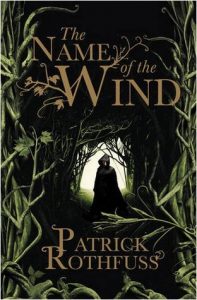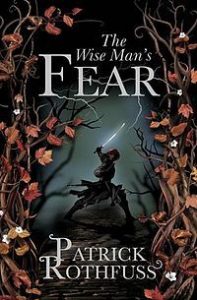5 Reasons the Kingkiller Chronicle Will (or Won’t) Adapt Well
Last week, we were treated to the (in my view) welcome news that esteemed genre film director Sam Raimi is in talks to direct the in-development adaptation of Patrick Rothfuss’s beloved—and sometimes divisive—Kingkiller Chronicle.
Reports have mentioned all manner of planned adaptation strategies, from a film trilogy with an accompanying premium television series (*cough* Dark Tower, anyone?) to everything in between.
But we’re not here to dive into the nuts and bolts.
We’re here to take a broad view of the core qualities of Rothfuss’s narrative Raimi and Company’s adaptation would do well to translate, while allowing that there may be aspects of the very same narrative that will prove difficult or even problematic without Rothfuss’s famous prose to accompany it.
1. Classic Hero Origin (Should Work)
 There is a vocal minority—or is it a majority, at this point?—who see Kvothe, Rothfuss’s core protagonist, as a glorified male Mary Sue.
There is a vocal minority—or is it a majority, at this point?—who see Kvothe, Rothfuss’s core protagonist, as a glorified male Mary Sue.
I’m not here to argue against that. In fact, in this particular instance, I’m going to put that very claim forward as an advantage the series has when it comes to translating the source material to a larger audience.
There’s a reason the classic hero’s journey works so well on the masses: it’s wish fulfillment. It makes the reader—and the watcher—feel special as he or she experiences a character’s path from rags to riches, street urchin to hero.
Kingkiller flips this trope on its head early on by showing us a beaten-down, adult version of Kvothe in the opening scene, so we know things don’t quite go his way, but his origin—like all the best heroes—is rooted in tragedy. Namely, the deaths of his parents, and his entire ‘family,’ who’re killed by blue-colored demons known as the Chandrian.
It’s a haunting opening, and one that provides proper fuel and motivation for the narrative to kick off, and it’s something that should work well in the realm of adaptation.
2. Threats … and Lack Thereof (May Not Work)
This second point may stand out as a bit of a contradiction to the first … and it totally is. In fact, that’s kind of the point.
While Kvothe’s journey is kicked off by an unspeakable tragedy, it’s shockingly easy to lose sight of that as his story chugs along page after page, chapter after chapter. We follow Kvothe as he explores the trials and tribulations of teen love, Hogwarts-style schooling, and the occasional side quest, some of which result in a few close calls.
That said, few—if any—of these occasions for true, dangerous conflict call back to the root cause for Kvothe’s entire arc, which is supposed to be vengeance. The reader can remind himself or herself that every move Kvothe makes is in service to this larger goal, a goal that should consume him, body and soul as he rockets toward a violent and inevitable reckoning with the beasts who essentially made him.
That said … through two long, loooong volumes, we’ve seen very little that calls back to that initial conflict, and some are beginning to wonder if we’ll get a classic confrontation between our core hero and our inciting incident (err … villains) at all.
Maybe Rothfuss is trying to subvert the whole thing, and we’re not destined to see Kvothe throw down in an epic rap/rock battle with the Chandrian. Still, it often feels like the narrative—and thus, the central character—lose sight of the ‘Why’ regarding his journey and instead get caught up in the ‘How.’
The best adaptations have a sense of momentum to them. A clear—if occasionally dipping—upward trajectory. Kingkiller, in my view, does not follow this trend, which might make the whole thing come off as more aloof than compelling for your average viewer.
3. Worldbuilding (Should Work)
While the Kingkiller Chronicle takes its time to move Kvothe from one plot point to the next, it does manage to widen the scope and canvas of his fictional world by revealing tantalizing bits of lore, including regional and international politics, an intriguing magic system whose origins aren’t fully understood and a storied and largely hinted-at history.
But one of the things that makes the series such an addicting and compelling read for so many is the idea—well, the fact—that we know Kvothe ends up being an iconic figure in some of the most oft-told and wide-reaching songs and tales of his day. And we’re the lucky ones who are privy to the truth, which may or may not be as flattering.
Rothfuss tells us this at the outset. He tells us the ‘What’ in the opening scene. Hell, he tells us in the synopsis … but he doesn’t tell us the ‘How.’ I did say above that Rothfuss sometimes gets too caught up in the ‘How’ without embracing the ‘Why.’ Well, in regards to worldbuilding, all those details will serve the Kingkiller adaptation well … even if it sets a table full of monumental expectation both the source material and any adaptation could eventually bow under the weight of.
4. Characters, or Lack Thereof (May Not Work)
Some readers hate Kvothe and others love him. Either way, every single person who reads the Kingkiller Chronicle will have an opinion of the titular bard before they’ve reached the midway point of the first novel.
 That’s great. It’s great in book form and it’s honestly even better in a visual/audio medium like film and television. Viewers need a character to latch onto, to be compelled by, to be fascinated with even if they don’t particularly like him.
That’s great. It’s great in book form and it’s honestly even better in a visual/audio medium like film and television. Viewers need a character to latch onto, to be compelled by, to be fascinated with even if they don’t particularly like him.
Still, since the narrative—as said above—does take its time, and tends to meander, an adaptation of the Kingkiller Chronicle would likely rely heavily on the inclusion and exploration of ancillary characters to widen the canvas and trawl the depths of Rothfuss’s fantasy world.
The thing is, there aren’t a whole lot of compelling people in this world. At least, none that we get to spend a significant amount of time with, and none that seem as if they’re living entirely separate lives with entirely separate motivations from Kvothe himself.
In a way, every character in the series serves as a catalyst or a sounding board for Kvothe. That may work in a book, where we’re reading from Kvothe’s point of view. It could come off as hollow or wooden in an adaptation, like a one-man show with empty marionettes serving as the window dressing.
5. Glorious, Infuriating Secrets (Should Work … But May Not)
Having a central mystery as the driving force behind a narrative is a tried, tested and true way to ensure reader and viewer attachment to the material. Part of the reason we’re compelled to watch even something decidedly more simple such as Harry Potter is because we’re eager to learn exactly why he lived when so many others in his same situation did not. We want to know who the dark wizard/lord is, what his motivations are, and how our hero is going to defeat him.
The Kingkiller Chronicle—despite subverting expectations at turns—follows the same core structure. Kvothe is an orphan. (Trope check.) Kvothe is driven by vengeance. (Trope check.) Kvothe seems to be pretty damn great at everything, and by the end of book 2, he’s managed to earn some of the lofty titles he outlines when first we meet him.
That said, the Kingkiller Chronicle seems to be building to a massive reveal—or series of reveals—in its final volume. But we’ve had very little to chew on in the preceding work. There are many questions asked in the setup to the story, but as we near the end point, few have had particularly satisfying answers.
That might work as a clever bit of subversion on the author’s part, but I wonder how it will translate to a wider audience—hell, even its core audience—if the series follows the same trend with regards to its prime mystery, the reason we’re following Kvothe in the first place.
I suppose readers could be compelled simply to see how Kvothe ended up the way he did at the start of book 1, but if the ending to the sequel is any indication, even grown-up Kvothe isn’t quite at the end of his journey, which is a promising sign.
This one could go either way, but, no matter the answers that lay at the end of Kvothe’s road—or, god forbid, more questions—fans should hope that any potential adaptation has something emotionally resonant to build toward, which is why this one is still undecided, and also why its success or failure rests firmly in the hands—and at the end of the pen—of Patrick Rothfuss.
The producers have assembled a talented group of writers, artists and filmmakers to bring Rothfuss’s vision to life, with significant input from the creator himself. Like The Name of the Wind, this story appears to have a great start. Let’s see if it manages to build to something greater.


I agree that the show has great potential, especially with Raimi and Lin adding their creative talents… but I thought we’d have learned a lesson from GRRM and Benioff / Weiss, who had to finish their own version of the story before the author finished it.
The layman has no idea how far Pat is on Doors of Stone, and that’s fine, he can take as long as he needs. But that could be another ten years. I’m hesitant to start filming this trilogy before the ending is decided upon, unless Pat is directly involved with writing the script.
I feel like a fully-written trilogy can plant ideas in the first film that grow into fruition by the final film — same as how a trilogy works… but if no one knows how it’s going to end, I don’t think we’re going to get the best possible version of this story until the source material is done.
This world is vast and its surface barely scratched. There’s a prequel series coming to Showtime, yes? Maybe about the Tinkers before Kvothe was born? That one should be the focus right now until all of the original story is completed.